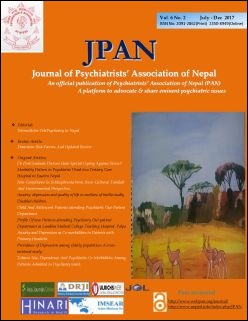Do PostGraduate Doctors Have Special Coping Against Stress?
DOI:
https://doi.org/10.3126/jpan.v6i2.21751Keywords:
Stress, Coping, Post-Graduate DoctorsAbstract
Introduction: The aim of this study was to assess the level of perceived stress and identify coping strategies associated with it in postgraduate doctors. We also wanted to assess association among various socio-demographic variables, stream of post-graduation, level of stress and type of coping.
Material And Method: This was a cross sectional assessment by online survey on convenient samples of 99 post graduate doctors (completed MD degree in both clinical and non-clinical stream) working in various medical colleges in two countries i.e. India and Nepal. The main scales used were Perceived Stress Scale (PSS) and Brief COPE.
Results: The sample of Indian doctors (ID) in our study perceived significantly higher stress (18.18±5.87) than the sample of Nepalese doctors (ND) (14.4±6.68). Coping strategies in the sample of ID tend to become more of ‘avoidance’ type when stress level increased to moderate-severe stress unlike ND {1.802(p0.075)}. The result of correlation analysis was in alignment with the above findings.
Conclusion: There is significant stress among post graduate doctors in any stream. There are several faulty coping types that have potential to hamper the decision-making capacity of a doctor. These issues need to be addressed in order to increase the efficiency of doctors either in clinical or in non-clinical specialties. Thus, we can save the saviors from the ill-effects of stress and make them function effectively and improve their quality of life.
J Psychiatrists’ Association of Nepal Vol. 6, No. 2, 2017, Page: 8-14
Downloads
Downloads
Published
How to Cite
Issue
Section
License
This license enables reusers to distribute, remix, adapt, and build upon the material in any medium or format, so long as attribution is given to the creator. The license allows for commercial use.




